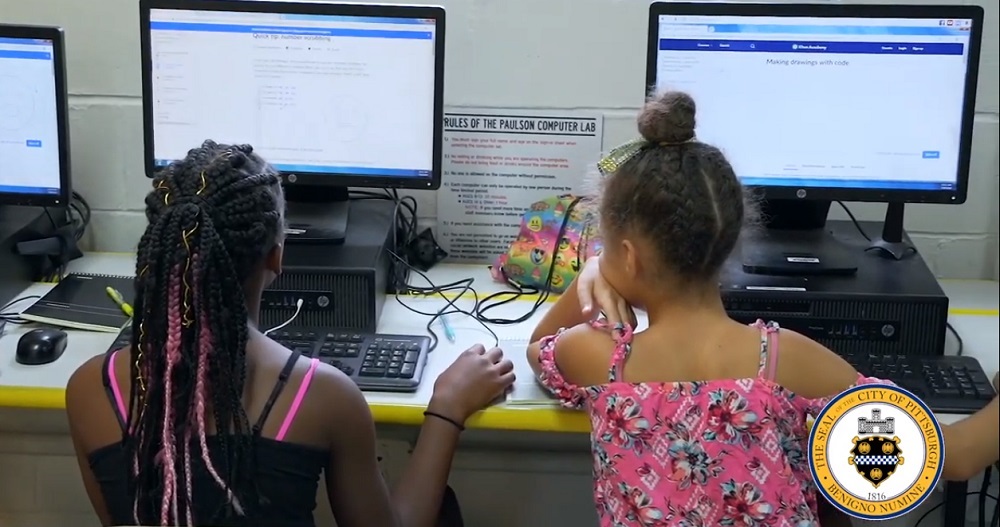
$500,000 STEM grant awarded to Citiparks, Remake Learning and Allegheny County Library Association
Lots of kids can master computer games, but how many can create or even modify one? That’s one goal of exposing young people to computer science and computational thinking that several organizations in Pittsburgh are working to achieve.
Remake Learning, the Allegheny County Library Association and Citiparks are sharing a $500,000 PASmart Advancing Grant from the state Department of Education to expand access to computer science and STEM (science, technology, engineering and mathematics) education. State officials estimate that over the next decade, seven in 10 new jobs in Pennsylvania will require workers to use computers and new technologies.
Remake Learning tries to ensure that learners are connected to places where they live, work and play, says Tyler Samstag, the organization’s director.
“This grant really embodies that sort of mindset — connection,” says Samstag. “The goal is to connect schools, out-of-school-time providers and libraries in a strategic way. There is computer science learning happening in each of those places. We’re seeing, increasingly, computer science taught in elementary school, as early as Kindergarten, teaching things like breaking a problem down into smaller pieces and then organizing those pieces in a logical way.”
According to Code.org, Pennsylvania has more than 12,800 computing jobs but only about 60 percent of public high schools in the state teach computer science.
“It is actually one of the subjects that most students say is the most fun for them, an enjoyable class,” says Samstag. “The thing that we really emphasize is the difference between computer literacy — being able to navigate the computer easily — versus computer science, where you’re leveraging computing in order to create. You can play a game on the computer, but with computer science, you can create your own game or take a game and modify it. The latter is an empowering experience for students.”
The K-12 Computer Science Framework notes that informal education organizations are essential to the learning process. Some out-of-school-time providers offer learning projects that are “deeper, project-based real-life learning experiences, whereas schools provide learning concepts,” Samstag says. “There’s a unique opportunity for those two to be more uniformly aligned. That’s at the heart of what we’re hoping to accomplish through this grant, to create an environment that facilitates the pipeline between out-of-school-time and school learning.”
Remake Learning will work with Citiparks and the Library Association to offer professional development to their staff members and teachers. Also, they plan to recruit K-12 teachers to pair up with the out-of-school-time providers. Together they’ll create learning opportunities in computer science and STEM subjects to give kids access to these subjects in and out of classrooms.
“Citiparks and the libraries will purchase supplies to be used for kids, but it won’t be in place for the kids until the fall,” says Samstag. “The grant was submitted a year and a half ago, but there was a significant delay because of Covid.”
According to the grant application, the partnership’s work will be documented to demonstrate its effectiveness. Over a year’s time, teaching teams will design and test computer science projects, evaluating the results with students. Researchers will host student focus groups, observe classrooms, and gather student input.
“We must create an ecosystem that connects in-school and out-of-school providers and serves the diverse needs of all learners,” the grant application explains.
Citiparks will use its portion of the funding— approximately $90,000 — to upgrade its Rec2Tech program at three city recreation centers with new furniture, equipment and hardware. Rec2Tech provides tech classes for young people to help bridge the digital divide. The STEM instruction is free.
“This is a great opportunity to continue to build Rec2Tech as a regional leader in creating equitable access to high-quality tech learning opportunities for youth,” says Kathryn Vargas, Citiparks assistant director for community recreation.
Rec2Tech classes were offered virtually in 2020 and have expanded with new classes in computer coding this spring. These include:
• Four weeks of coding for both beginners and intermediate-level participants;
• An informal monthly coding meet-up with new projects each month;
• Virtual talks with tech professionals about potential careers;
• A four-week summer learning experience in STEM for middle-school kids in partnership with the Pittsburgh Technology Council.
This fall, a National Science Foundation Digital Harbor Foundation program will begin. This three-year partnership will build out tech maker spaces in two Citiparks recreation centers and provide a maker-based tech curriculum to participants.